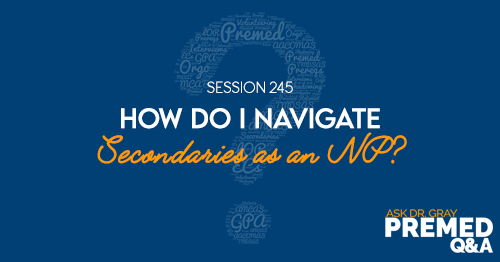Apple Podcasts | Google Podcasts
Session 192
The nontrad career-changer is wondering if he should talk about his ADHD anywhere in his application. He’s also worried about how to articulate his life experiences and translate it on the application. Let’s shed some light on these today!
Ask Dr. Gray: Premed Q&A is brought to you by Blueprint MCAT. Listen to this podcast episode with the player above, or keep reading for the highlights and takeaway points.
The episodes in this podcast are recordings of our Facebook Live that we do at 3 pm Eastern on most weekdays. Check out our Facebook page and like the page to be notified. Also, listen to our other podcasts on MedEd Media. If you have any questions, call me at 617-410-6747.
[00:22] Question of the Day
“I have ADHD and I was diagnosed with it for a while. I never got accommodations. I did a little badly in my undergrad and throughout my educational career. Then when I started being more informed about it and getting the care I need, I started doing really well and it shows.
Should I disclose it since it’s the main thing that affected my performance? Should I disclose that to medical schools? I’m just a little afraid that there’s a little bit of a stigma around it.”
Answer:
One of the hardest questions out there is disclosing a potential red flag to schools. If it’s not a core reason why you want to be a physician, then you don’t need to include it there.
But if it’s a big reason why you want to be a physician, then you probably will have to include it to tell your story about why you want to be a doctor. That said, you have to know there are some biases and prejudices out there against students with ADHD or whatever students are going through.
'There are a million reasons why someone doesn't do well in undergrad.'Click To TweetThere are various reasons students don’t do well in undergrad. Many career changers don’t realize they wanted to be a doctor until after college or over a period of time. So they don’t think grades are important.
[04:56] How to Articulate Transferable Skills
“As a career changer, after I graduated from my first undergrad, I went out into the professional workforce. I worked, got married, bought a house, and did all these “adulting” things that one would do. I was also an entrepreneur. So I believe that gives me a lot of experience that I’ve seen and can offer to my classmates. But it’s hard for me to articulate it.
How do you explain that just because I bought a house and went through that process and paid mortgages and have all these responsibilities, I’m suddenly a better candidate? I don’t know how to explain that without sounding arrogant.”
Answer:
Home ownership is probably not a perfect example here. But entrepreneurship is a great example to show your tangible skills. Look at what skills, traits, and experiences you can add to the educational environment of your classmates. What can you tangibly take from that and bring to the class?
Moreover, this should only come up when asked. You can most likely bring this up in your secondary only when it specifically asks it such as what diversity you can bring. Diversity is much more than just the color of your skin, where you were born, or the languages you speak. It also covers skills, traits, and life experiences that you can add to the class.
Do not talk about this in your personal statement because the personal statement is about why you want to become a doctor.
[08:10] Final Thoughts
There are a lot of students with ADHD so you are not alone. Having ADHD will not prevent you from being a great medical student or a great physician or a great resident either. It is what it is, and you’ll be fine!
Links:
Medical School HQ Facebook page
Medical School HQ YouTube channel
Instagram @MedicalSchoolHQ
Join the Application Academy!
The Premed Playbook: Guide to the Medical School Personal Statement
The Premed Playbook: Guide to the Medical School Application Process
SEARCH SITE
LISTEN FOR FREE












